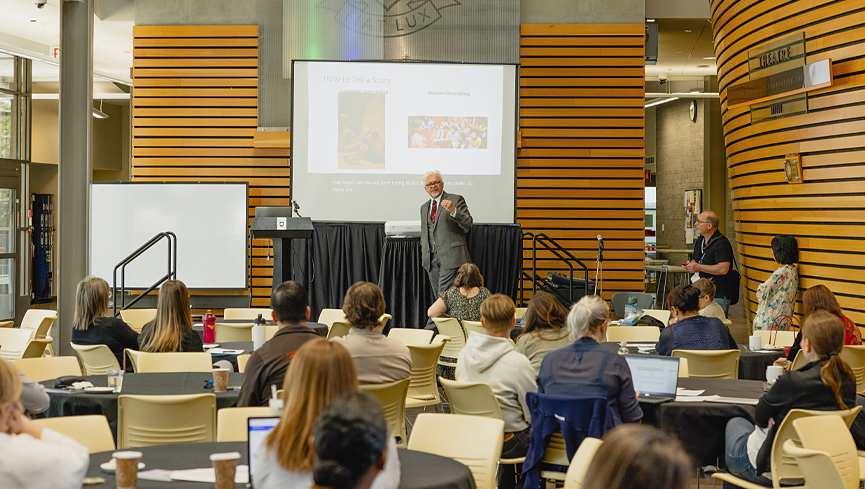The Collaborative Health Research Institute of Southern Alberta (CHRISA) Unconference on Cultivating Solutions drew a diverse group of participants from across Alberta, including researchers, patients, health practitioners, program administrators, advocates and health-care professionals. The Unconference prioritized conversation over presentation and focused on topics that were relevant to attendees, who decided on the agenda, discussion items and topics of sessions.
“It’s gone beyond expectation; we had over 100 people register,” says Dr. Brenda Leung, CHRISA director. “This is an unconventional format that I think really attracted people. They were enthusiastic and engaged and our breakout sessions were packed.”

In an unconference, attendees determine the issues and topics for further discussion, as well as facilitate the sessions. The format brings different stakeholder perspectives together to spark new ideas and collaborations.
“I received positive feedback from people who said they thought this is a great way to connect with people they normally would not have,” says Leung.
Teri Price and her father Dave were among those in attendance. Their son and brother Greg had testicular cancer that went undiagnosed for too long.
“He sort of fell through the cracks, multiple cracks in the health-care system,” says Teri. “He eventually did have surgery, was experiencing pain and had some other symptoms. He went to the emergency room, was sent back home and then died of a blood clot in my parents’ home.”
As a result, the Health Quality Council of Alberta investigated and that led to the release of a report called Continuity of Patient Care Study. The Price family established Greg’s Wings, a non-profit organization dedicated to building awareness and working together to develop better solutions for the future.
“We believe we need to have diverse perspectives in the same room sharing their knowledge and ideas in order to actually push the health-care system forward,” says Teri. “It’s awesome to be in a room with a bunch of people we can learn from. To be able to hear from people who have deeper knowledge in different topic areas is really helpful.”
“It was well-structured to provide the opportunity for those who have passion in this area to meet other people and figure out ways to collaborate and work together,” says Dave.
Nolan Schaaf (BN ’03), director of clinical and quality improvement with the Chinook Primary Care Network (Chinook PCN), and several members of his team attended the conference to expand their connections within the community.
“Our team is really organized around creating systems of care in family practice, working towards trying to create accessible, comprehensive care for patients in the community,” says Schaaf. “It’s all about people having access to care where they live. We recognize that health is bigger than health care and so connecting with community partners and those who can help with issues that drive health, such as income security, is important. We need to build better connections with our community partners. This is such a cool opportunity to come together and meet people who don’t live in our circles and make unique connections that wouldn’t happen day-to-day. This is the kind of event where you don’t solve a problem, but you create connections where you can start to generate something new in the future.”
The Chinook PCN exists through an agreement with Alberta Health Services and local family physicians to support primary care services. It receives government funding to build what’s called a Patient’s Medical Home. The Network brings physicians, registered nurses, licensed practical nurses, mental-health providers, social workers and other health-care providers together on an as-needed basis through their family physician’s office.
